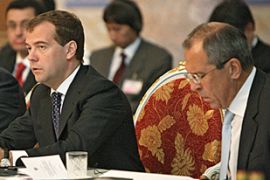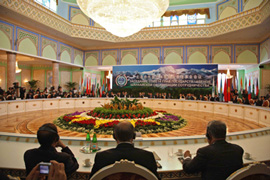EU considers sanctions on Russia
Discussions are the product of a “sick imagination”, Russian foreign minister says.

“Apart from that my friend Kouchner also said that we will soon attack Moldova and Ukraine and the Crimea … But that is a sick imagination and probably that applies to sanctions as well,” Lavrov told reporters in the Tajik capital.
“I think it is a demonstration of complete confusion,” he said.
The warning was made “just because they’re upset that the ‘little pet’ of certain Western capitals didn’t fulfill their expectations,” Lavrov said, referring to Georgia.
Georgia summit
France, which holds the rotating European Union presidency, has called a meeting of EU heads of governments on Monday to discuss the Georgian crisis.
Kouchner said several European countries were in favour of imposing sanctions but a French diplomat said France itself was not one of the countries pushing for them.
France, which brokered a six-point ceasefire between Russia and Georgia, has taken a more moderate line than other European countries like Britain, but has been increasingly frustrated by what it sees as Moscow’s failure to comply with the plan.
Moscow says it is complying with the ceasefire, but it has yet to pull back its troops as agreed.
It has also recognised two breakaway regions of Georgia as independent states even though the plan calls for international talks on security arrangements there.
Nicolas Sarkozy, the French president, who spoke with Dmitry Medvedev, the Russian president on Wednesday, has insisted Russian forces that have not yet pulled back to their positions before fighting broke out must do so immediately.
But Kouchner said Paris would remain patient.
“France is not in favour of cutting relations with Russia. This will be solved by negotiation. We need time, we’re under no illusion about that,” he said.
Asia ‘support’
Also on Thursday, an Asian security alliance denounced the use of force used in the Russia-Georgia war and called for respect for every country’s territorial integrity.
Thursday’s joint declaration from the Shanghai Cooperation Organization (SCO) deepens Russia’s international isolation over its military action, which was blasted in the West for being disproportionate.
 |
| The SCO members met in the Tajikistan capital Dushanbe [AFP] |
According to Russian news agencies, the declaration says the presidents reaffirmed their commitment to “efforts aimed at preserving the unity of a state and its territorial integrity.”
The declaration also says “placing the emphasis exclusively on the use of force has no prospects and hinders a comprehensive settlement of local conflicts”.
Medvedev had appealed to the alliance, which consists of member states Russia, China, Kazakhstan and three central Asian countries of Kyrgyzstan, Tajikistan and Uzbekistan, for unanimous support of Russia’s response to Georgia’s “aggression”.
Neave Barker, Al Jazeera’s correspondent in Moscow, said the SCO’s response was not the “clear-cut bold show of support” that Russia had possibly hoped for.
“It has been half-hearted to a certain extent. We have to remember that a number of those leaders…the likes of President Karzai of Afghanistan, President Ahmadinejad of Iran, have their own domestic and foreign policy issues with themselves and with the West.
“It’s unlikely they’re going to stick their neck out to lend unbridled support for Russia’s call for independence in South Ossetia or Abkhazia at the risk of throwing a spanner in the works for their own domestic problems as well.”
Georgia launched a military offensive into its separatist-held region of South Ossetia on August 8.
Russia in response piled hundreds of tanks into the Moscow-friendly regions, pushing out the Georgian army and then pushing deeper into Georgia proper.
Towns and villages in South Ossetia and in Georgia were subject to air raids and extensive looting by South Ossetian militia groups.